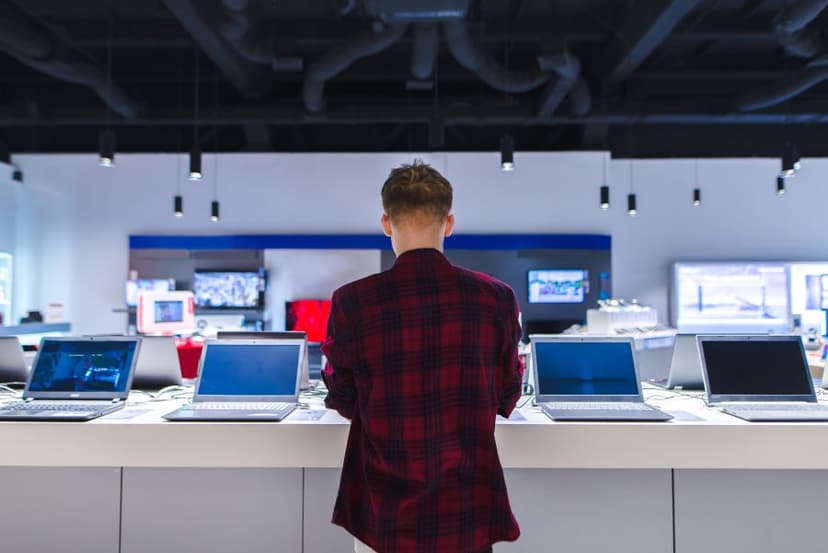The Ultimate Guide to Choosing the Perfect Laptop
Ethan Taylor • November 1, 2024 • 6 min
Finding the ideal laptop can enhance your productivity, entertainment, and overall digital experience. With so many options available, understanding what to look for is essential.

In this guide, we’ll cover the essential factors, from operating systems to processors and budget-saving tips, to help you choose a laptop that meets all your needs.
How to Choose a Perfect Laptop for Your Needs
Selecting the right laptop starts with identifying what you need it for—whether it’s work, gaming, creative tasks, or general use. Factors like processing power, screen quality, and battery life are important considerations, but your unique requirements should drive your choice. If you're a professional, you might prioritize processing power and RAM, whereas casual users might prioritize portability and screen quality.
To find a laptop that aligns with your needs, list out the essential tasks you’ll be using it for and focus on the specs that support those tasks effectively. Understanding each component’s role in performance will help you make an informed decision.
Pick Your Operating System
The operating system (OS) shapes your overall experience with the laptop. The main choices are Windows, macOS, and Chrome OS:
- Windows: Known for flexibility, Windows laptops support a wide range of software and are popular for gaming, productivity, and business.
- macOS: Exclusive to Apple laptops, macOS is known for its streamlined user interface and seamless integration with other Apple products.
- Chrome OS: Ideal for web-based tasks and basic applications, Chrome OS is lightweight and is commonly found on budget-friendly Chromebooks.
Your choice of OS will influence your laptop’s functionality, app compatibility, and sometimes even hardware options. Select the OS that best aligns with your workflow and device ecosystem.
Know Your CPUs
The central processing unit (CPU) is the brain of your laptop and greatly affects performance. Common CPU brands include:
- Intel: With its popular Core series (i3, i5, i7, i9), Intel offers a broad range of CPUs suitable for basic to high-performance tasks.
- AMD: Known for Ryzen processors, AMD provides solid performance and value, often competing closely with Intel in both budget and high-performance categories.
- Apple’s M-series: Exclusively for Apple laptops, the M-series chips (M1, M1 Pro, M2, etc.) are highly efficient and deliver impressive performance and battery life.
Consider the types of tasks you need the laptop for. For everyday browsing and light tasks, an Intel i3 or AMD Ryzen 3 is adequate, while more demanding applications will benefit from Intel i5/i7 or AMD Ryzen 5/7.
Which Graphic Card to Choose
Graphics cards, or GPUs, are essential for tasks like gaming, video editing, and graphic design. Laptops come with two main GPU types:
- Integrated GPUs: Built into the CPU, these are suitable for general tasks and some light gaming or video streaming.
- Dedicated GPUs: These provide significantly higher performance and are necessary for gaming, 3D rendering, and other graphic-intensive applications. Popular choices are NVIDIA’s GeForce series and AMD’s Radeon series.
Choose a dedicated GPU if you’ll be running graphic-heavy software; otherwise, an integrated GPU will suffice for typical daily use.
How to Pick Your Processor
Your processor choice depends on your required performance level:
- Basic Tasks (Browsing, Email, Office Apps): Intel i3 or AMD Ryzen 3 processors are cost-effective options.
- Moderate Tasks (Photo Editing, Multitasking): Intel i5 or AMD Ryzen 5 offers a good balance of power and affordability.
- High-Performance Tasks (Gaming, Video Editing): Intel i7/i9 or AMD Ryzen 7/9 processors are best suited for intensive tasks.
- Apple Laptops: Apple’s M1 and M2 series are optimized for high performance with impressive energy efficiency.
Match the processor to your main activities, ensuring it will handle your needs efficiently.
How Much RAM and Storage Space?
The amount of RAM and storage impacts both the performance and the type of tasks your laptop can handle.
- RAM: For most users, 8GB is sufficient for everyday tasks, while 16GB or more is ideal for multitasking, professional software, and gaming.
- Storage: Solid-state drives (SSDs) offer faster data access than traditional hard drives (HDDs). Aim for 256GB SSD as a minimum, but 512GB or 1TB is better if you store large files or media.
Ensure your laptop has the necessary RAM and storage to run your applications smoothly and accommodate your files.
What Kind of Screen?
Screen quality affects comfort and usability. Key factors to consider include:
- Resolution: Full HD (1920 x 1080) is standard, while 4K is ideal for design and media-heavy work.
- Size: Smaller screens (13-14 inches) enhance portability, while larger screens (15-17 inches) provide more viewing space.
- Refresh Rate: A high refresh rate (120Hz or more) improves the experience for gaming and fast-motion content.
Evaluate screen features based on your primary activities and preferred balance of size and portability.

5 Steps to Make Your Choice
Here’s a quick checklist to simplify your laptop selection:
- Define your primary needs: List the tasks you’ll use the laptop for.
- Set a budget: Allocate a budget range that fits your requirements.
- Choose your OS: Decide on Windows, macOS, or Chrome OS.
- Match specs to needs: Align the CPU, GPU, RAM, and storage with your main uses.
- Consider future-proofing: If possible, choose slightly higher specs to accommodate future needs.
Following these steps will help you find a laptop that fits both your current and potential future requirements.
How to Save on a New Laptop Purchase
Laptops can be expensive, but there are ways to save:
- Shop during sales events: Big sales like Black Friday and Cyber Monday offer significant discounts.
- Refurbished models: Certified refurbished laptops from reliable retailers offer great value.
- Student discounts: Many retailers provide special pricing for students.
Saving on your laptop purchase is possible with a bit of planning and strategic timing.
Benefits of Ordering Laptops Online
Ordering a laptop online provides several benefits:
- Price comparisons: Easily compare prices across retailers to find the best deal.
- Wider selection: Online stores often offer a greater variety than physical stores.
- Convenience: Get your laptop delivered directly to your home.
Online shopping is a convenient way to explore various options and often provides access to exclusive online discounts.
Where to Find Discounts on Laptops
Finding good deals on laptops can make a big difference. Look for discounts in these places:
- Retailer websites: Check for seasonal sales and online-exclusive deals.
- Electronics stores: Many stores have year-round discounts on select models.
- Manufacturer websites: Brands often offer direct deals on their official sites.
Combining these sources will increase your chances of finding the best discounts on laptops.
Which Laptops Are The Best for Seniors
When choosing a laptop for seniors, prioritize simplicity and accessibility:
- User-friendly OS: Consider Chromebooks with Chrome OS for easy use or macOS for a streamlined interface.
- Clear display: A laptop with a large, high-resolution screen improves readability.
- Battery life: Long battery life reduces the need for frequent charging.
- Lightweight: Choose a lightweight laptop for easier handling and portability.
Laptops designed with ease of use in mind can make a big difference in usability and enjoyment for senior users.
Conclusion
Selecting the right laptop involves assessing your needs, understanding the key components, and knowing where to find the best value. By carefully considering your primary tasks and future needs, you can make an informed choice that meets your requirements and budget.
Sources
- Laptop Buying Guide. https://www.techradar.com/laptop-buying-guide
- Choosing the Right Laptop: An Overview. https://www.pcmag.com/choosing-the-right-laptop
- Best Laptops for Different Needs. https://www.digitaltrends.com/best-laptops
- Understanding Laptop Specs. https://www.cnet.com/laptop-specs-guide